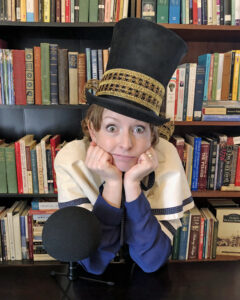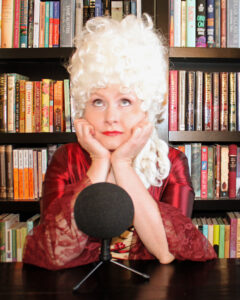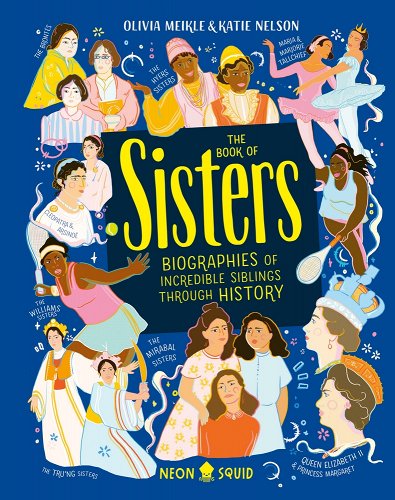Talking About Women’s History: Three Questions and an Answer with Katie Nelson and Olivia Meikle
I am thrilled to have, sister-professors Katie Nelson and Olivia Meikle, the hosts of the What’sHerName podcast, back as my guests. I listen to a lot of podcasts, but What’sHerName is one of a handful that I make sure I listen to on the day they go live. What’sHerName tells the stories of fascinating women you’ve never heard of (but should have). The show is an engaging blend of story-telling, historical banter between the hosts, and interviews with experts. It is consistently smart, funny and thought-provoking. (And I thought that before they asked me to record an episode or two with them.)
Katie and Olivia bring impeccable credentials to the project:
Katie Nelson has a PhD in History from the University of Warwick and teaches courses in history, travel, and the meaning of life at Weber State University. She loves exploring life’s big questions and bringing students to Europe every year on study abroad courses.
Olivia Meikle teaches Gender and Women’s Studies at Naropa University in Boulder, Colorado. She has an MA in English Literature and Women’s and Gender Studies from the University of Colorado at Boulder.
Now they have a new project coming out: The Book of Sisters is a non-fiction book for kids (or eternally curious adults) about sisters who made a mark on history, coming out on April 4th. I can hardly wait for my copies to reach the bookstore
Take it away, Katie and Olivia!
* * *
There is a long tradition of collective biographies of notable women, that are written to provide female role models for girls. Do you see The Book of Sisters as part of that tradition?
Katie: I’m not sure if our editors originally conceived of the book in that vein, but I wanted to put a very different twist on it. I had the idea of writing a history of the world, in sisters. I was awed and a bit intimidated by the thought: could we authentically cover all the main episodes of world history with a new set of glasses on, so to speak? I knew it would be a big challenge. Happily for me, our amazing editors were on board too!
And there are certainly plenty of women in the book who shouldn’t be anyone’s role models! Rather than being inspiring, they are downright terrifying. Some sets of sisters destroyed each other and everyone around them…and it’s all part of the wider human story. I am so glad we were able to present the whole variety of human experience. I think it’s important NOT to present historical characters as idealized heroes to model our lives on. Who could ever live up to a perfect fantasy? We’re all flawed humans, stumbling toward enlightenment.
Olivia: Yeah, I’m pretty proud that this book is so much more than just what can sometimes (not always!) turn into a fairly reductive and/or dismissive “big book of ladies” – and instead we’re taking this often-complicated relationship and using it as a throughline through human history, looking at these characters and events – some well-known and some very unknown – from a unique and very specific angle that (we hope) yields equally unusual and fascinating results! (Just to be clear: There are lots of GOOD examples of those type of books. I own tons of Books of Ladies that I love dearly!)
Was it difficult to find historical sisters for the book?
Katie: Happily, a decade of teaching world history at university helped me out here. Still, as I was mapping out the historical roadmap of the book, there were some “chapters” of world history that struck me as particularly masculine. Genghis Khan’s Mongolian Empire, for example – where would I find sisters in this (immensely important, primary source-starved) episode of world history? But wouldn’t you know it – just a little bit of digging beneath the surface led me to Jack Weatherford’s book, The Secret History of the Mongol Queens, and there it was: Genghis Khan’s daughters built and sustained the whole operation. Without those four sisters, there would have been no Mongolian Empire.
This confirmed for me that the lack of women in our historical narratives isn’t the fault of today’s historians. The scholarly research and the books are out there, now: we just need to help those stories make the leap into popular culture, placing these women as main characters in our collective historical narratives. Hopefully, with a book like this, we can help make that leap a reality.
Olivia: Yeah, I confess I was a bit nervous if we’d be able to do it, but this kind of thing kept happening – whenever there were particular “holes” we needed to fill in the narrative or in the map, after a bit of determined digging we’d uncover another incredible story just begging to be told! And thank goodness for supportive spouses. Our wonderful men got almost as invested in the project as we did – I can think of at least three ‘sets’ of sisters in the book that my husband Matthew found before I did!
What work of women’s history have you read lately that you loved? (Or for that matter, what work of women’s history have you loved in any format? )
Olivia: I recently finished 18 Tiny Deaths,about the completely fascinating Frances Glessner Lee, the middle aged Chicago “socialite” responsible for almost single-handedly establishing modern forensic medicine in the US in the early 20th century, and it was such a wild and unexpected story I could hardly put it down! The relentless and passionate commitment this woman showed toward what she saw as the pursuit of real ‘justice for all’ was inspiring and totally astonishing. And I know Katie just basically devoured Kim Todd’s Chrysalis, on 17th century naturalist Maria Sibylla Merian, who was doing groundbreaking field research on entomology and botany almost a century and a half before Darwin.
Katie: I also want to plug the podcast The Exploress as one of my favorite works of women’s history “in any format.” Kate Armstrong’s research and attention to detail is impeccable, and the script is full of so many laugh-out-loud witty remarks. I love it!
And for our question for you – We want to know your thoughts on the long tradition of collective biographies designed to provide female role models for girls?
I read those books as a kid, when I could get my hands on them. (There weren’t as many of them then as there are now.) And I loved those books. They gave me models that said it was okay to be tough/mouthy/opinionated/different.
But ultimately I think we need something more than role models. We need to show young girls, young boys, and grown-ass people of all genders that “women’s history” is simply history. Because we were there, y’all. We were there.
***
Want to know more about Katie Nelson and Olivia Meikle and the amazing work they do?
Listen to the podcast: https://www.whatshernamepodcast.com/
Follow them on Twitter: @WhatsHerNamePC
Follow them on Facebook: https://www.facebook.com/whatshernamepodcast
Follow them on Instagram: https://www.instagram.com/whatshernamepodcast/
* * *
Come back tomorrow for three questions and an answer with Theresa Kaminski, author of a new biography of Dale Evans, the Queen of the West.







